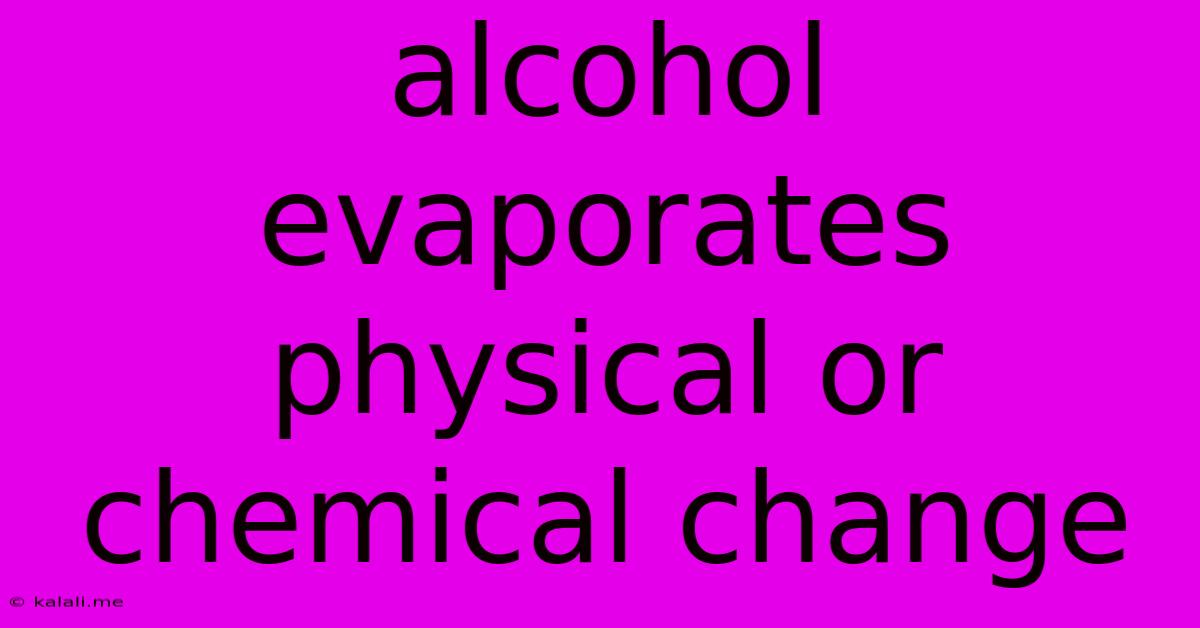Alcohol Evaporates Physical Or Chemical Change
Kalali
May 09, 2025 · 3 min read

Table of Contents
Is Alcohol Evaporation a Physical or Chemical Change?
Alcohol evaporating might seem like a simple process, but understanding whether it's a physical or chemical change requires a closer look at the fundamental nature of matter and its transformations. This article will delve into the details, explaining why alcohol evaporation is definitively a physical change, and exploring the related concepts.
The simple answer is that alcohol evaporation is a physical change. This is because the chemical composition of the alcohol remains unchanged throughout the process. The liquid alcohol simply transitions to its gaseous state, a change in its physical form rather than its chemical makeup.
Understanding Physical and Chemical Changes
Before we dive into the specifics of alcohol evaporation, let's clarify the difference between physical and chemical changes:
-
Physical Change: A physical change alters the form or appearance of a substance but doesn't change its chemical composition. Examples include melting ice, boiling water, dissolving sugar in water, and – as we'll demonstrate – alcohol evaporating. The substance remains the same; only its state or form changes.
-
Chemical Change: A chemical change, also known as a chemical reaction, alters the chemical composition of a substance. New substances with different properties are formed. Examples include burning wood, rusting iron, and cooking an egg. The original substance is fundamentally transformed.
The Evaporation Process: A Closer Look at Alcohol
When alcohol evaporates, the liquid alcohol molecules absorb energy (usually in the form of heat). This energy increases their kinetic energy, allowing them to overcome the intermolecular forces holding them together in the liquid state. These molecules then escape into the air as a gas (alcohol vapor). Crucially, the molecular structure of the alcohol – the arrangement of atoms within each alcohol molecule – remains intact. There's no breaking or formation of chemical bonds. It’s simply a change of state.
Distinguishing Evaporation from Combustion
It's important to differentiate between the evaporation of alcohol and the combustion of alcohol. While evaporation is a physical change, the combustion of alcohol is a chemical change. Combustion involves a chemical reaction with oxygen, producing carbon dioxide and water. This reaction fundamentally alters the chemical composition of the alcohol. Evaporation, on the other hand, involves only a change of state, with no new substances formed.
Factors Affecting Alcohol Evaporation Rate
Several factors influence how quickly alcohol evaporates:
- Temperature: Higher temperatures increase the kinetic energy of the alcohol molecules, accelerating evaporation.
- Surface area: A larger surface area exposes more alcohol molecules to the air, increasing evaporation.
- Airflow: Good airflow removes alcohol vapor from the vicinity, preventing it from condensing back into a liquid and promoting further evaporation.
- Humidity: High humidity slows evaporation as the air already contains a significant amount of water vapor, reducing the capacity for alcohol vapor.
In conclusion, the evaporation of alcohol is a purely physical change. The alcohol molecules transition from a liquid to a gaseous state without any alteration in their chemical composition. Understanding this distinction is vital for grasping the fundamental principles of chemistry and the behavior of matter.
Latest Posts
Latest Posts
-
Jaguar Adaptations In The Tropical Rainforest
May 10, 2025
-
How To Find Average Velocity From Velocity Time Graph
May 10, 2025
-
What Is Non Living Things In The Ecosystem
May 10, 2025
-
How Many Fl Oz In 6 Cups
May 10, 2025
-
What Is 1 Percent Of 5000
May 10, 2025
Related Post
Thank you for visiting our website which covers about Alcohol Evaporates Physical Or Chemical Change . We hope the information provided has been useful to you. Feel free to contact us if you have any questions or need further assistance. See you next time and don't miss to bookmark.